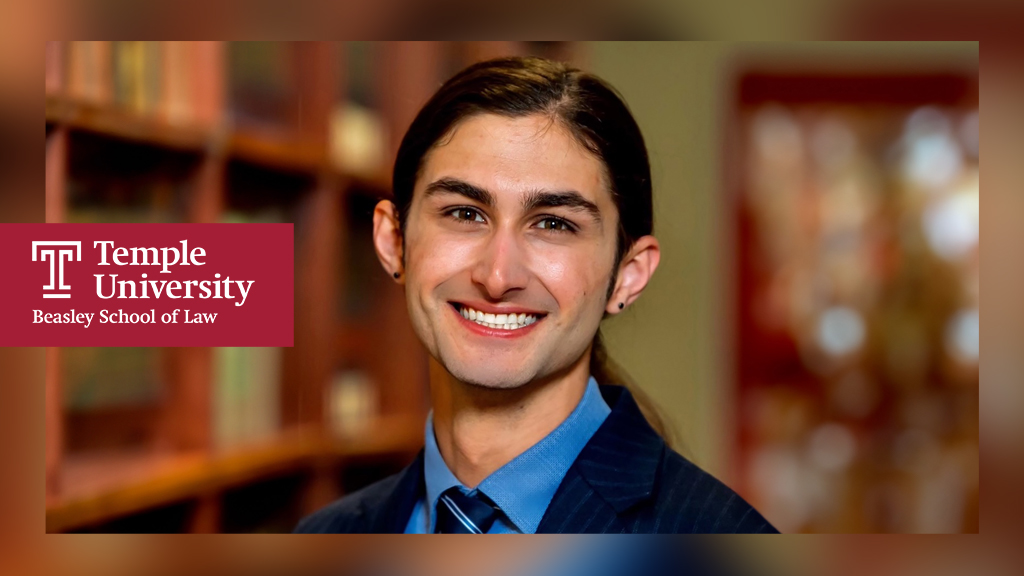
Motivation in becoming a lawyer
Hometown: Albuquerque, NM
Education: Trinity University-Texas | B.S. in Mathematical Finance; Minor in Vocal Performance
Job: Judicial Law Clerk, Judge Morris G. Smith, New Jersey Superior Court, Appellate Division
Program: Full-Time Day
My desire to create an accountable government that effectively and fairly serves the public motivated me to become a lawyer. After the Ferguson uprisings of 2014 and the murder of George Floyd in 2020, I wanted to be a part of the movement striving to hold the criminal legal system accountable for abuses against underserved and marginalized communities. My grassroots advocacy in San Antonio, Texas revealed the numerous barriers that those wronged by government often face in seeking any semblance of justice. I realized that if I was going to have any success in raising those barriers, I needed the tools of a lawyer.
Temple Law taught me that lawyers wield tremendous power to change legal systems. Whether it be in a courtroom, in the corridors of City Hall, or within government agencies, lawyers have numerous avenues to create, change, or enforce government policies for the betterment of others. Temple Law not only showed me these alternative paths but gave me the skills to effectively advocate for my ideas no matter which path I chose.
Throughout my time at Temple Law, my motivations have greatly expanded. Where the heart of my advocacy will always be in police accountability, I now see numerous opportunities to accomplish my goal of creating a government that serves everyone.
Experiential learning
Temple’s Law & Public Policy Program made a tremendous difference in my legal education. As an L&PP Scholar, I interned with the United States Attorney’s Office for the District of Columbia my first summer of law school. Along with an internship, I had the opportunity to write a policy paper and present that paper not only to my classmates, but to scholars in the fields of law, sociology, and criminology at the annual Law & Society Association Conference in San Juan, Puerto Rico. Through the L&PP program, I honed my writing and presentation skills and broadened my professional network.
Independent practicums were also a crucial part of my time at Temple Law. In my first independent practicum, I had the privilege to intern with Councilman Curtis Jones, Jr., Philadelphia’s fourth councilmanic district councilmember, and Samantha Williams, a Temple Law alum and currently a judge on the Philadelphia County Court of Common Pleas. It was under their guidance that I learned the intricacies of legislative work and the government processes used to turn policy proposals into law.
For my second practicum, I worked alongside Temple Law Professor Kenneth Jacobsen, Councilman Isaiah Thomas, and Councilman Thomas’ legislative team to draft and pass the first city ordinance protecting the name, image, and likeness of high school athletes, as well as expanding access to information on National Letters of Intent deals.
Finally, through an independent practicum, I was able to accomplish my dream of working for Philadelphia’s Citizens Police Oversight Commission. At CPOC, I pursued my passion for government accountability by conducting the first audit of the Philadelphia Police Department’s disciplinary arbitration process. My faculty advisor, Professor Shanda Sibley, ensured that I established achievable goals at the outset of my practicum and provided invaluable guidance as I navigated the various ways that my research could benefit CPOC’s mission. I have Temple Law to thank for making my dream a reality.
Participation and leadership
Promoting student wellness was a pivotal part of my Temple Law experience. During my first year of law school, I founded the Temple Law Tea Club. Tea meetings served as a space for learning about tea and cultivating lasting friendships within the first-year class. The tea club even brought in outside speakers, like entrepreneur Jason McDonald, to discuss the intersection between tea, environmental law, and LGBTQIA+ representation in the legal field. In my second and third year, I served as the co-president of the Student Wellness Association, providing resources and organizing events for students to take time away from their studies to rejuvenate their bodies and minds.
Both leadership roles showed me the importance of fostering camaraderie and communal support needed in law school environments. Law school can be an isolating experience, which is why creating spaces where students can get away from their studies and have fun was of such importance to me. These communities help to relieve stress and give students the tools to weather the difficulties both during and after law school.
